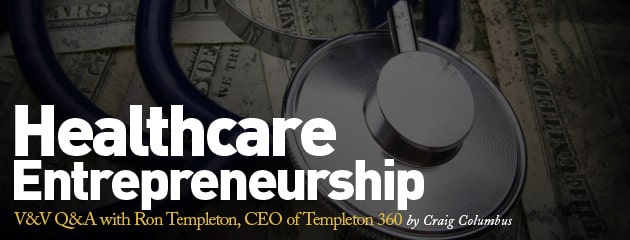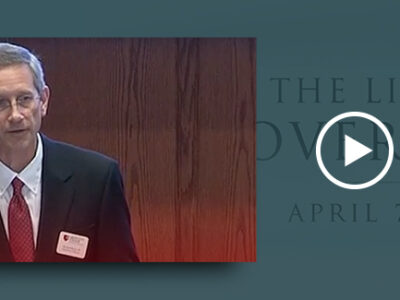
Editor’s note: The “V&V Q&A” is an e-publication from The Center for Vision & Values at Grove City College. In this latest edition, fellow for entrepreneurship and innovation with The Center for Vision & Values and chair of the entrepreneurship department at Grove City College—Dr. Craig Columbus—interviews the CEO of Templeton 360, Ron Templeton. With more than 25 years of experience in launching, financing, and managing early stage healthcare technology companies, Mr. Templeton’s ventures have been acquired by UnitedHealthcare, Walgreen, Fidelity National Information Services and Blue Cross/Blue Shield. He recently delivered a lecture on “Healthcare Entrepreneurship in the ObamaCare Era” as a part of the Visionary Entrepreneurship Speaker Series at Grove City College.
Dr. Craig Columbus: First off, Mr. Templeton, how did you become involved in the healthcare field?
Ron Templeton: I became interested in healthcare very early. I experienced health issues when I was young, and thanks to the world’s greatest healthcare system, I recovered fully. Right out of school, I started working in the new healthcare technology field, developing and marketing the first physician billing and electronic medical-records systems.
I have always had great respect for the medical profession, healthcare technology companies, and many other players in the healthcare marketplace. Considering my experience, both as a patient and a healthcare IT entrepreneur, I am deeply suspicious of the government efforts to “fix healthcare.”
Columbus: Our conversation is very timely in light of U.S. District Court Judge Roger Vinson’s recent ruling striking down the entire Patient Protection and Affordable Care Act. I know you are not a lawyer, but you certainly have a lot of firsthand experience in healthcare policy. So let’s talk a little about Judge Vinson’s rationale, specifically his problem with the provision that requires individuals to purchase insurance. What is the issue with the mandate?
Templeton: I don’t agree with the policy or the politics. Requiring citizens to buy health insurance seems contrary to the Constitution and an abuse of the commerce clause. It also seems to trample the 10th amendment, which is in part why we are seeing so many states coming out against it.
Republicans who support individual liberties and responsibility are generally opposed to the mandate. Some Democrats would just prefer a single-payer system—or some other kind of entitlement. The American people spoke out in the last election against more government spending and debt.
I am concerned that while we engage in academic debates about this, the Obama administration is implementing ObamaCare, driving up costs, pushing people out of the medical profession, and stifling investment and innovation.
Columbus: Judge Vinson’s logic seems very similar to that of Judge Hudson, who also struck down the individual mandate in the Virginia case late last year. Would you agree?
Templeton: I agree. Nonetheless, the administration continues to implement the legislation. With each passing day, it becomes increasingly difficult to unravel. I am hopeful that the Supreme Court will consider this on an expedited basis.
Columbus: What do you think the Vinson ruling means for the future of “ObamaCare?”
Templeton: I believe ObamaCare is contrary to prevailing legal and public opinion and will ultimately be overturned or repealed. I remain concerned about what happens between now and then.
Columbus: Does it get harder to overturn the legislation from a political perspective because the only parts of the bill that have been implemented are generally popular with the public, such as the no pre-existing condition provision?
Templeton: No. Although a few provisions may be ear pleasing, on balance the bill involves less consumer choice, more spending, more debt, and more government—ideas that the public rejected during the last election.
In fact, as the administration promulgates more and more of the enacting regulations, the American people will begin to get a clearer understanding of what this legislation means. It then may become easier politically to repeal or overturn.
Columbus: But the Affordable Care Act is still the law of the land, unless the Supreme Court rules otherwise. Does the uncertainty make it difficult for the business community in general or for healthcare entrepreneurs?
Templeton: Uncertainty keeps capital (and innovation) on the sidelines.
This is unfortunate because there is a lot that can be done in the free market to improve healthcare in this country. And all of this is on hold.
Columbus: The president spoke a lot about the need for innovation in his recent State of the Union address. Where do you think we are in terms of the healthcare innovation cycle?
Templeton: I believe we are on the cusp of tremendous innovation in healthcare. This includes not only breakthroughs in pharma, biotech, diagnostics and robotics to improve care, but it also involves new technologies in billing, prescribing and other systems that will add efficiency and reduce costs.
But for this innovation to be realized, the government needs to get out of the way.
I am also concerned that the spending spree we have seen in Washington (by both Republicans and Democrats) will push up interest rates and raise the cost of capital. In healthcare, where technologies are expensive to develop and take years to come to market, this can also put a significant drag on entrepreneurs and innovation.
Columbus: So you are optimistic about the role that the private sector still has to play in healthcare?
Templeton: Absolutely. I think some of our elected officials may have taken us off track. But I believe we are already seeing the course correction.
It is the private sector that made this country great and we, as a nation, are starting to return to our senses.
Most of the great innovations—in healthcare, technology, the Internet—come from the United States. And although we outsource much of the manufacturing, the ideas are born here. We just need our elected and unelected officials to get out of the way and allow entrepreneurs to do what they do best.
I am as optimistic as I was when I started my career 25 years ago—optimistic, that is, about the role of the private sector.
Columbus: Specifically, what do you think are the greatest opportunities for entrepreneurs within the field?
Templeton: I believe the next great trend in healthcare will be a consumer revolution. Until now, the consumer has been detached from the market.
The last time you went to the doctor, do you know how much the office visit cost? Probably not, because your insurance company paid the bill. Do you know how much your medications cost? An MRI? Have you compared your doctor’s prices for an office visit with another physician who may be equally well trained, but charges less?
I believe once the threat of ObamaCare is over, we will see a new generation of products, services and technologies—and maybe even policies—that empower the consumer. Patients will begin to ask how much the service costs, if it is necessary, and if they can get it for less elsewhere.
Ultimately, if there is a healthcare crisis in this country, I believe this is the way to fix it: If we put the consumer back in the driver’s seat, we will see better quality, more innovation, greater choice, and lower prices.
Entrepreneurs that empower consumers in this way will do very well in the coming decade.
Columbus: Thank you, Ron.
— Ron Templeton, CEO of Templeton 360, LLC, is a leading healthcare expert with more than 25 years of experience in launching, financing, and managing a portfolio of early stage healthcare technology companies.


